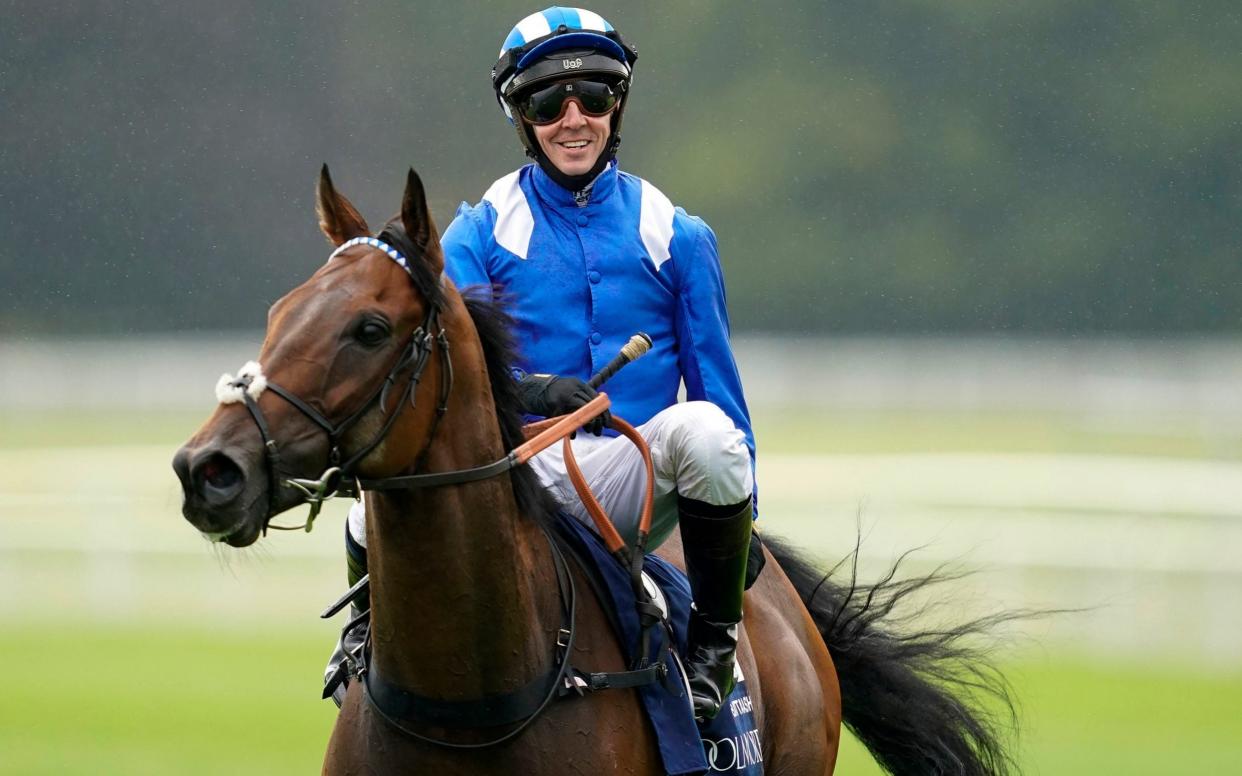British jockeys cleared to ride at Arc meeting without being forced to miss a week's racing on return

British jockeys were on Tuesday night cleared to ride at the Prix de l’Arc de Triomphe meeting at Longchamp this weekend without having to miss seven days’ racing on their return.
The news came after discussions between the British Horseracing Authority and Public Health England and requires frequent testing and daily post-travel monitoring with Dr Jerry Hill, the BHA chief medical adviser, for 21 days. They will still have to self-isolate for seven days apart from the purposes of “training or competing”.
The exemption also includes trainers, so John Gosden could go to supervise Enable and Stradivarius, now the only British runners after Telecaster was ruled out, come back, and train his horses and go racing. However, he would not be able attend Tattersalls sales next Tuesday, which is why he remains likely to stay at home.
But it does mean Jim Crowley could now maintain his relationship with Battaash in the Prix de l’Abbaye, and Tom Eaves could ride Glass Slippers in the race, without having to miss seven days racing on their return. More pertinently for British racing, it also means Frankie Dettori and Ryan Moore will not have to sit out Future Champions Weekend at Newmarket.
Best free bets and offers for the Prix de l'Arc de Triomphe
Prix de l’Arc de Triomphe 2020 ante-post betting odds and news
The news about Telecaster came after Hughie Morrison was not happy with him at exercise on Tuesday. Despite being a 20-1 outsider, the four-year-old colt won his last start in the Grand Prix de Deauville by over six lengths on heavy ground and conditions appeared to be coming in his favour at Longchamp, where it is already “very soft”.
“It’s one of those things,” Morrison said. “He’s not right and we can’t run him. For a medium-sized yard, it is upsetting for everyone but particularly the lads and staff who eat and drink these horses every day.”
Telecaster was one of seven horses to come out at Tuesday’s second forfeit stage, which left 15 in the race, with the possibility of a supplementary entry or two, including the Derby winner Serpentine, on Wednesday.
In contrast to Telecaster, last year’s French Derby winner and Arc third, Sottsass is in great form, according to his trainer, Jen-Claude Rouget, who is yet to saddle an Arc winner.
“His race in Ireland [beaten two lengths by Magical in the Irish Champion Stakes] did him the power of good,” the trainer said. “I am discovering the same horse as I did in the lead-up to the 2019 race. The calendar has been perturbed by the pandemic but the Arc has always been his objective. We didn’t go overboard, he goes there fresh and he has a right to be concerned at the finish again.
“I agree he has not shown the required level of form to win the Arc this season, but I believe he will run well and finish in the first three.”
Tributes paid to Kondrat, Gold Cup-winning jockey
Adam Kondrat, the only French-based jockey to win the Cheltenham Gold Cup when partnering The Fellow to victory for Francois Doumen in 1994, has died.
He was 53 and had been running a fruit and vegetable business in the south-west France since retiring 10 years ago but was diagnosed with cancer three months ago.
The Polish-born jockey was originally a Flat apprentice with Mike Batholomew in Chantilly but after putting on 10 kg in weight in one year, the trainer sent him to his neighbour, the jump trainer Francois Doumen.
He became stable jockey at the time of the ‘three musketeers’ The Fellow, Ucello and Ubu III, three exceptional jumpers. On The Fellow he won the 1991 and 1992 King Georges and though he was beaten a short-head in two Gold Cups, which brought criticism from the British press, he was triumphant in 1994.
“He came to me at the right time,” said Doumen. “Horses jumped very well for him, he was sensitive to them and knew a good stride. When I went to England people said I should have an English or Irish jockey but I was not known, the best weren’t available and I preferred to use the guy who knew the horses
“He was quite young when he came to France. His French wasn’t that good but our relationship was lovely – like father-son. He was always positive and smiling. I’m very sad.”


